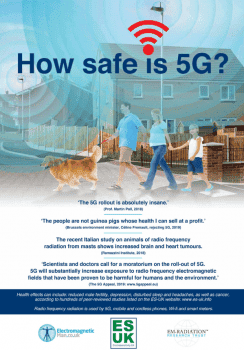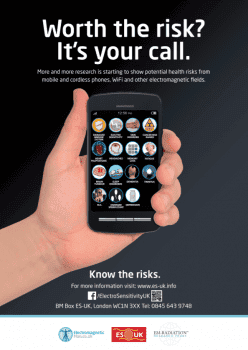ASA bans ad claiming 5G causes infertilityASA bans ad claiming 5G causes infertility
Campaign group Electrosensitivity UK has been told its advert claiming 5G causes infertility and depression cannot be used in its current form as there is no evidence to support the statements.
January 9, 2020

Campaign group Electrosensitivity UK has been told its advert claiming 5G causes infertility and depression cannot be used in its current form as there is no evidence to support the statements.
In response to seven complaints made about the advert, which appeared during July and August, the Advertising Standards Authority (ASA) has put an end to the group’s fearmongering campaign. The ASA simply stated the group lacks robust scientific evidence and is misleading the general public.
 The advert featured a family of three holding hands as they walked their dog, along with four quotes from experts and their fears regarding the implementation of 5G. The advert also suggested 5G would cause male infertility, depression, disturbed sleep and headaches, as well as cancer.
The advert featured a family of three holding hands as they walked their dog, along with four quotes from experts and their fears regarding the implementation of 5G. The advert also suggested 5G would cause male infertility, depression, disturbed sleep and headaches, as well as cancer.
In defence of its misleading claims, the organisation stated that no research had been done to prove 5G was safe, the radiation associated with the frequencies is unsafe, a World Health Organisation (WHO) factsheet on mobile connectivity was wrong and UK Government studies were inaccurate and dated.
The group also stated the question ‘How safe is 5G?’ was open-ended and unbiased, and allowed readers to accept, reject or ignore it.
In assessing the advert, the ASA has stated that due to the assertions of Electrosensitivity UK, the group would have to hold robust scientific evidence, including longitudinal studies with human participants. It does not have evidence of this nature.
On the claims the WHO factsheet, entitled ‘Electromagnetic fields and public health: mobile phones’, is in accurate, the ASA has rubbished this as a validation to mislead the general public. Claims the UK Government is also misinformed have also been rubbished.
However, evidence was presented by Electrosensitivity UK to validate its propaganda campaign. This evidence was found to be flimsy, with the ASA noting many of the articles presented were studies on animals rather than humans, or commentary from scientists, as opposed to robust and validated experiments to prove the claim.
In short, Electrosensitivity UK has no scientific justification to make such statements.
While this is a bold statement to make in-light of the drive towards the digital economy, this is not the first time Electrosensitivity UK has found itself on the wrong side of the ASA. In April 2018, another advert from the group was banned which claimed mobile phones caused numerous different health detriments including headaches, heart palpitations, skin disorders and cancer.
 Again, the ASA banned this advert on the grounds that Electrosensitivity UK did not have the scientific evidence to support the claims that mobile technology was the cause of such afflictions. And once again, the evidence provided by Electrosensitivity UK to defend the advert was found to be flimsy.
Again, the ASA banned this advert on the grounds that Electrosensitivity UK did not have the scientific evidence to support the claims that mobile technology was the cause of such afflictions. And once again, the evidence provided by Electrosensitivity UK to defend the advert was found to be flimsy.
What is worth noting is while there is little science to support the paranoia of Electrosensitivity UK, this is not the only group which is objecting to the rollout of 5G connectivity.
In Brighton during October, councillors and members of parliament were presented with evidence in an attempt to prevent the deployment of 5G equipment by the ‘Brighton and Hove 5G Alliance’. The group made similar health claims to Electrosensitivity UK, and the issue has been kicked down the road for review in the future. For the moment, it does appear paranoia has won out in Brighton.
Although 5G progress has been halted in Brighton, at least Electrosensitivity UK is being held to the proper standards. Unfortunately, the group seems to be a serial offender when it comes to the dissemination of misinformation. Perhaps it won’t be too long before the next attempt to mislead the general public with unvalidated health claims and mis-contextualised science.
About the Author
You May Also Like










.png?width=300&auto=webp&quality=80&disable=upscale)


_1.jpg?width=300&auto=webp&quality=80&disable=upscale)